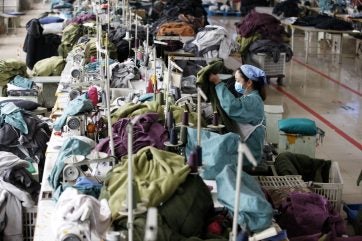
The Americas Act has been introduced by US Senators Michael Bennet (D-Colo.) and Bill Cassidy (R-La.), alongside US Representatives Maria Salazar (R-Fla.), Adriano Espaillat (D-N.Y.), and Mike Gallagher (R-Wis.) and coined “the only major strategic economic plan to counter China’s geopolitical and economic power in the Hemisphere and increase safety and stability to decrease regional migration.”
Bennet said: “No region has greater ties to the United States than the Western Hemisphere. Yet in recent years we have failed to offer the region a compelling economic alternative to China’s growing influence. This bill changes that. It creates an opportunity for the United States to renew our partnerships across Latin America and the Caribbean, strengthen the rule of law, deepen economic prosperity, and embrace our values in a shared struggle for democracy.”
Specifically regarding the textile and apparel sector, the bill calls for the establishment of a textile and manufacturing grant programme of $150m per year for five years to help combat “slave-based” Chinese textile and apparel labour, bringing textile and apparel investment back to the US and to Americas Partner countries, creating new jobs throughout the textile supply chain in the US and in Americas Partner countries, rewarding existing textile manufacturing enterprises in the Hemisphere, and solidifying the textile and apparel supply chain in the US and in Americas Partner countries.
It also details a grants and tax incentives programme to further establish a textile reuse and recycling industry in the US, which would reduce demand for Chinese textiles and challenge “slave-labour-based” textiles, reduce the carbon footprint of textiles, and improve the environmental standards of textiles. The programme would reduce waste and build a new US industry that could employ thousands or tens of thousands of people.
In addition, it aims to bolster CBP’s power to crackdown on goods under the Uyghur Forced Labor Prevention Act (UFLPA) and tax incentives to reshore and nearshore the textile and apparel industry from China.
Cassidy added: “We need to relevel the playing field between freedom-loving democracies and those who exploit the rules like China. We do that by refocusing on the Western Hemisphere to improve trade, bring manufacturing back to our shores, and end China’s growing influence. Our Americas Act will make economies across the hemisphere more resilient, governments more stable, and our hemisphere more prosperous.”

US Tariffs are shifting - will you react or anticipate?
Don’t let policy changes catch you off guard. Stay proactive with real-time data and expert analysis.
By GlobalDataThe bill aims to be a “multi-billion-dollar job creation tool for the US and its allies in Latin America and the Caribbean,” according to Espaillat.
“With its reshoring and nearshoring loans, tax benefits, and other targeted grant assistance for workers at home and in our Western Hemisphere partner countries, the Americas Act will bring jobs and investment back to our Hemisphere and stem the root causes of migration by putting more money into the pockets of working families. Importantly, by creating grant programmes for both textiles and medical devices and equipment, this bill directly bolsters two of the largest and most important export industries for the US’s current Western Hemisphere trade partners, including the Dominican Republic. All in all, the Americas Act represents the most transformative piece of legislation to benefit the Western Hemisphere in two decades.”
Neither the American Apparel & Footwear Association (AAFA) nor the National Council of Textile Organizations (NCTO) had responded to Just Style’s request for comment at the time of going to press.
The coalition claimed the loophole is being exploited by China and other foreign entities to allow goods produced through forced labour as well as counterfeit and harmful consumer products into the US market.
NCTO’s president and CEO Kim Glas pointed out that de minimis is not just a textile issue and she’s keen to urge others in Congress and the Administration to support the effort and immediately close de minimis.



